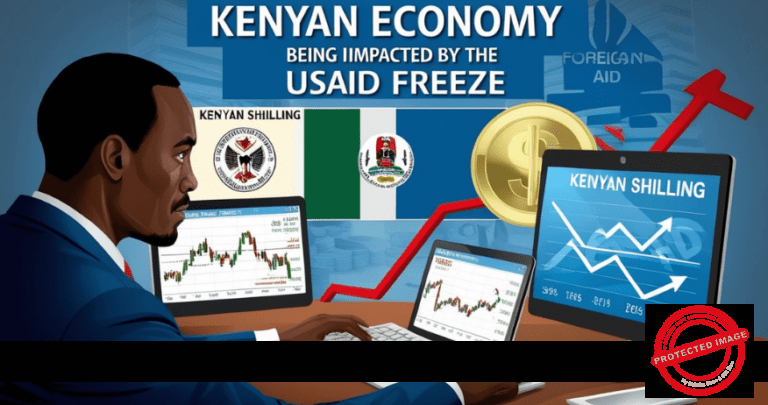Kenya’s Blue Economy is vital to the nation’s economic growth, providing jobs, revenue, and sustainable development opportunities. However, protecting natural resources is key to ensuring that industries like gold mining and maritime trade contribute positively to the economy.
Affiliate Disclosure: This post may contain affiliate links – I may receive a small commission if you purchase through links, at no extra cost to you. Read HERE.
Cabinet Secretary for Blue Economy and Maritime Affairs Ali Hassan Joho’s recent call for gold dealers to be licensed appropriately underscores the need for responsible resource management.
The Role of Gold Mining in Kenya's Blue Economy
Gold mining is a significant sector in Kenya’s economy. With the opening of the gold souk, a centralized market for processing and selling gold, the government aims to boost the industry while ensuring value addition occurs within the country. By refining and processing raw gold locally, Kenya retains more economic benefits and prevents foreign entities from exploiting its resources.
CS Joho emphasized that while gold mining offers excellent opportunities, it must be done responsibly. He urged traders to obtain the necessary licenses, ensuring their businesses operate legally and sustainably. Proper licensing protects the economy from illegal mining and helps preserve Kenya’s natural wealth for future generations.
Why Licensing and Regulation Matter
Illegal gold mining and unregulated trade pose significant risks to Kenya’s Blue Economy. Unchecked activities can lead to environmental degradation, economic losses, and even security concerns. Here’s why licensing and regulation are essential:
1. Preventing Environmental Damage
Unregulated mining leads to deforestation, soil erosion, and water pollution. Proper licensing ensures miners follow environmental protection guidelines, reducing harm to ecosystems and local communities.
2. Boosting Local Employment
A regulated gold market creates job opportunities for Kenyans. When raw gold is processed locally, more people are employed in refining, trading, and exporting, leading to economic growth.
3. Enhancing National Revenue
Illegal mining results in revenue loss as taxes and royalties go uncollected. An adequately regulated market ensures that the government earns its fair share, which can be reinvested into infrastructure, education, and healthcare.
4. Strengthening Security
Illicit trade in natural resources often funds criminal networks. By requiring proper documentation and tracking of gold transactions, authorities can prevent illegal activities associated with gold smuggling.
The Impact of the Gold Souk on Kenya's Economy
Establishing the gold souk at the Mall, recognized as the largest in East and Central Africa, is a significant step toward strengthening Kenya’s Blue Economy.
This initiative will:
- Provide a secure and organized marketplace for the gold trade.
- Encourage value addition before exports, increasing profits for local traders.
- Improve transparency in the mining sector, reducing fraud and corruption.
Kamukunji Member of Parliament, Yussuf Hassan, also noted that the gold market would benefit traders and local communities by creating job opportunities in areas like Eastleigh, where many small-scale miners and gold traders operate
Protecting Kenya's Natural Resources for the Future
While gold mining contributes significantly to Kenya’s Blue Economy, it is only one part of the larger framework, including fisheries, marine transport, and renewable energy. To ensure long-term sustainability, Kenya must:
1. Enforce Strict Environmental Laws
Mining companies and individuals must adhere to strict environmental regulations to prevent pollution and habitat destruction.
2. Promote Sustainable Practices
Encouraging responsible mining methods, such as reforestation and water conservation, will help maintain ecological balance.
3. Educate Stakeholders
Training programs for miners, traders, and the public on the importance of responsible resource management will foster a sustainable culture.
4. Invest in Research and Innovation
Developing modern, eco-friendly mining and processing techniques can reduce the environmental impact while increasing efficiency.
Final Thoughts
Kenya’s Blue Economy holds immense potential for economic growth, but protecting natural resources is essential for sustainability. The government’s push for proper licensing in the gold sector is a step in the right direction.
By enforcing regulations, promoting value addition, and investing in environmental conservation, Kenya can ensure that its natural wealth benefits both present and future generations.
As businesses and individuals engage in resource extraction, they must recognize their responsibility to safeguard Kenya’s natural heritage. Sustainable practices today will secure a prosperous tomorrow for all.
Related Articles
1. Understanding International Debts – Read HERE
2.
Next Steps
Are you struggling financially? Do you know the reasons? Discover some reasons why people struggle financially from this guide, “Financially Struggling? 12 Money Habits to Consider.” Also learn what actions may lead to your prosecution for tax, “Avoid Prosecution and Reputation Damage: Tax Crimes“
a. Affiliate Disclosure: These are affiliate links from which we receive a commission at no cost. Read full Affiliate marketing disclosure HERE.
b. Tax Contents Disclaimer: The tax industry in Kenya is very dynamic. The tax contents in the posts are not professional advice. Read full disclosure HERE.



